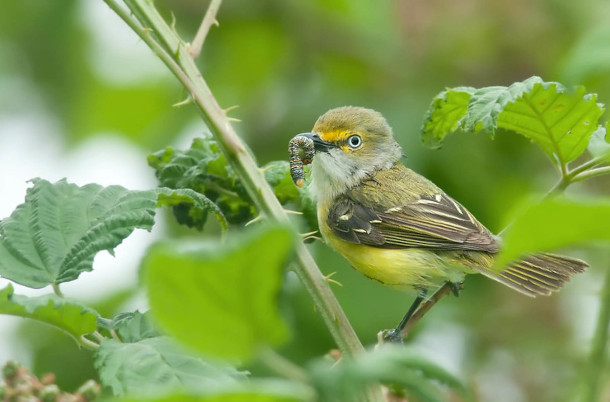BirdNote®: Insects Are Essential
Air Date: Week of August 19, 2022

A white-eyed Vireo grasps a caterpillar in its beak. (Photo: Kelly Colgan Azar, CC)
Insects sustain our ecosystems, as a food source and pollinators of 90% of all plants, but their numbers have dropped by half in the last 50 years. However, growing certain plants directly benefits birds and helps insects keep the natural world ticking. BirdNote®'s Mary McCann has the story.
Transcript
BASCOMB: This time of year many of us may be cursing the bugs that bite.
But as BirdNote’s Mary McCann reports, our tormentors are a delight
for birds.
BirdNote®
Insects Are Essential
Written by Bob Sundstrom
This is BirdNote.
[Wood Thrush song in background, followed by Nashville Warbler song, https://macaulaylibrary.org/asset/250158611#_ga=2.263181902.313880498.1…, 0.00-04]
MCCANN:A tiny Nashville Warbler flies to its nest, a fat caterpillar clamped in its beak. Nearly all of North America’s smaller birds, from this warbler to chickadees to thrushes, raise their young on insects—especially insect larvae like this juicy caterpillar.
[Rose-breasted Grosbeak song, https://macaulaylibrary.org/asset/248683961#_ga=2.121617544.1090204237…, 0.30-.34]
MCCANN:Insects sustain our ecosystems, and not just as a food source. They also pollinate 90% of all plants. And without plants at the heart of the food web, life on earth would simply collapse. As naturalist E.O. Wilson put it, insects are “the little things that run the world.”
Though insects are small, easily overlooked, and often vilified, most are beneficial. But their numbers have dropped by half in the last 50 years, so it’s now critical to help foster insects. One concrete way to help is to grow native plants that provide food and shelter for insects like caterpillars.
For example, in the Eastern United States and Midwest, buttonbush supports 18 different species of caterpillars and also provides food for birds in the form of nectar and seeds.
Growing such plants directly benefits birds and helps insects keep the natural world ticking.
Contact a local Master Gardener to help you find what’s best for your area. Begin at BirdNote.org.
I’m Mary McCann.
[Rose-breasted Grosbeak song, https://macaulaylibrary.org/asset/248683961#_ga=2.121617544.1090204237…, 0.30-.34]
Senior Producer: John Kessler
Production Manager: Allison Wilson
Producer: Mark Bramhill
Associate Producer: Ellen Blackstone
Bird sounds provided by The Macaulay Library of Natural Sounds at the Cornell Lab of Ornithology, Ithaca, New York. Nashville Warbler ML 250158611 M Medler
Rose-breasted Grosbeak ML 248683961 J McGowan
BirdNote’s theme was composed and played by Nancy Rumbel and John Kessler.
© 2021 BirdNote March 2021 Narrator: Mary McCann
ID# garden-13-2021-03-16 garden-13
[primary source is Douglas W. Tallamy, Nature’s Best Hope. Timber Press, 2019]
[quote from E.O. Wilson, “The Little Things That Run the World.” Conservation Biology 1 (4); 344-46]
Resources:
https://www.nwf.org/Garden-for-Wildlife/About/Native-Plants
https://www.audubon.org/PLANTSFORBIRDS
BASCOMB:For photos buzz on over to the Living on Earth website, loe dot org.
Links
Living on Earth wants to hear from you!
Living on Earth
62 Calef Highway, Suite 212
Lee, NH 03861
Telephone: 617-287-4121
E-mail: comments@loe.org
Newsletter [Click here]
Donate to Living on Earth!
Living on Earth is an independent media program and relies entirely on contributions from listeners and institutions supporting public service. Please donate now to preserve an independent environmental voice.
NewsletterLiving on Earth offers a weekly delivery of the show's rundown to your mailbox. Sign up for our newsletter today!
 Sailors For The Sea: Be the change you want to sea.
Sailors For The Sea: Be the change you want to sea.
 The Grantham Foundation for the Protection of the Environment: Committed to protecting and improving the health of the global environment.
The Grantham Foundation for the Protection of the Environment: Committed to protecting and improving the health of the global environment.
 Contribute to Living on Earth and receive, as our gift to you, an archival print of one of Mark Seth Lender's extraordinary wildlife photographs. Follow the link to see Mark's current collection of photographs.
Contribute to Living on Earth and receive, as our gift to you, an archival print of one of Mark Seth Lender's extraordinary wildlife photographs. Follow the link to see Mark's current collection of photographs.
 Buy a signed copy of Mark Seth Lender's book Smeagull the Seagull & support Living on Earth
Buy a signed copy of Mark Seth Lender's book Smeagull the Seagull & support Living on Earth

